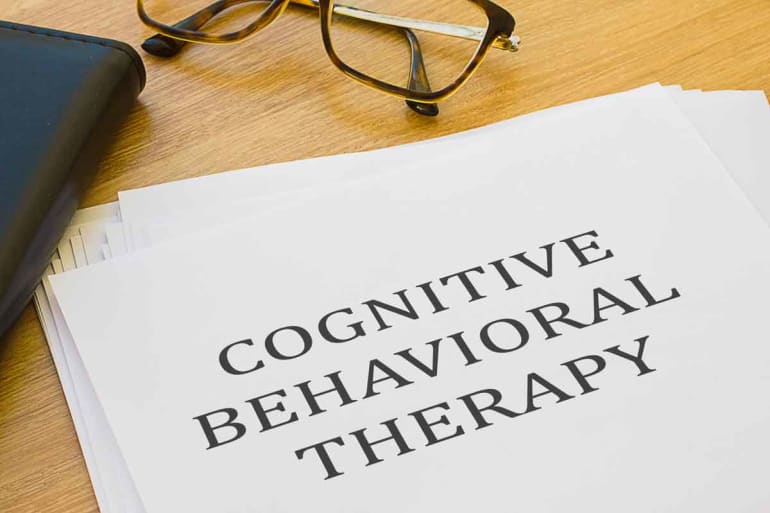Is CBT for Addiction an Effective Form of Treatment?
Cognitive Behavioral Therapy is a widely used form of treatment for substance use or addiction disorders. CBT for addiction is very effective, as this therapy style is an easy-to-use tool that many people can relate to easily.
Is cognitive-behavioral therapy useful in treating people recovering from an active substance use disorder? Is CBT effective enough to keep people from returning to drugs and alcohol? Keep reading to learn more about CBT and its effectiveness in treating addictions.
What is CBT?
CBT, or Cognitive Behavioral Therapy is a form of psychological treatment that has been demonstrated to be very effective in treating a number of psychological problems, including depression, anxiety, severe mental illness, and of course, substance use. This counseling style was founded in the 1960’s and has been used successfully ever since.

CBT is based on several basic core principles. The three most used are:
Problems are based, in part, on faulty or unhelpful ways of thinking.
Problems are based, in part, on learned patterns of unhelpful behavior.
People suffering from psychological problems can learn better ways of coping with those problems, and can therefore find relief from symptoms and lead a better life.
How Does CBT Work for Addictions?
Cognitive Behavioral Therapy is a type of talk therapy that helps people to understand the connections between their thoughts and their actions and gives them tools to use to change both. It is an off-shoot of behavior therapy. In traditional behavior therapy, the focus is on how to directly change someone’s behaviors. CBT instead works to change the thoughts that are driving those behaviors.
Addictions clients being treated with CBT will be working to change patterns of thinking that they have held onto for some time. They may have thoughts and beliefs that are intrusive, irrational and/or negative. This work can be difficult, but if done thoroughly can be life-changing for the addicted patient.
CBT for Addiction: Is CBT Effective for Substance Use Disorder?
The short answer is that yes, Cognitive Behavioral Therapy is very effective in helping to treat substance use disorders when used in conjunction with a person-centered treatment plan. Since substance abuse often stems from negative thoughts that can result in negative behaviors, it makes sense that CBT, a method of challenging and changing those negative thoughts, would be effective.
More on How CBT works for Treating Addiction
A therapist’s role in treating the patient of the addiction with CBT is to guide them through the process of identifying and then changing those thoughts and behaviors that no longer serve them. Often, patients will have a disconnect between the things that they want to do in life and the things that they actually do. A trained CBT therapist can help patients work through these incongruences and make steps toward aligning the patient’s wants to their actions.
For example, if someone repeatedly finds themselves in relationships that are toxic or dangerous, CBT can help with that. A therapist will work with this client to assist them in uncovering the inner thought dialog that is leading them to choose these relationships. They will then work with the individual over time to help them recognize those inner thoughts and redirect them.
As addiction clients work through this process of recognizing and changing their thought patterns, their behaviors will start to change as well. Given enough time and practice, this can benefit a person in all aspects of their life and create lasting, positive behavior change.
As it relates to addiction, CBT is a very useful tool in the therapist’s toolbox. Addiction is, in part, a behavior that we want to change, and cognitive behavioral therapy helps people change behaviors.
Specific CBT Tools Used for Addiction
When treating an individual who is recovering from substance use disorder, a therapist will use different techniques or tools in the style of cognitive-behavioral therapy. These tools can help patients to cope with triggers, or the thoughts and behaviors that lead to drinking or using drugs. There are also other CBT exercises that help addiction patients explore the reasons behind their drug use.
For Managing triggers, a therapist will teach the following tools:
Recognize – Identify which circumstances lead to using drugs or drinking.
Avoid – Remove yourself from trigger situations whenever possible.
Cope – Use CBT techniques to address and alleviate the emotions and thoughts that lead to substance use.
For investigating thought patterns, the following can be useful:
- Imagery Based Exposure – This exercise leads recovering addicts through thinking of a memory that produces powerful negative emotions. They sit with those emotions with the help of a therapist, and overtime, the emotions to that memory are reduced.
- Behavioral Experiments – These types of exercises use the contrast of negative thoughts against positive ones to see which type has a bigger impact in changing behavior. Each of us is different and will respond better to either positive or negative feedback.
- Thought Records – Here, addictions clients will examine their negative thoughts and look for factual evidence that will either support or disprove those thoughts. This helps by showing the client how their thoughts are unbalanced or irrational.
CBT is an Effective Treatment Modality for Addiction
Cognitive-behavioral therapy is an effective treatment for many mental health disorders, including anxiety, depression, and others. It’s especially effective in treating addiction and working with the underlying mental health disorders that often accompany substance use disorders.
And while CBT is an effective method of treating substance use disorders, it’s not the only one. Studies show that the best treatment plans for addiction patients involve combining CBT with other effective treatment methods. Every person is different and will respond to therapy in a different way. Experienced addiction counselors know that using a variety of tools and being able to switch methods when needed is the best way to help clients find lasting sobriety.
Other Effective Treatments for Addictions
We incorporate many different treatment types when working with our addictions clients, all of which have shown to be effective in some way. Medication-Assisted Treatment (or MAT) is another largely helpful method for substance use treatment. MAT uses medications along with talk therapy to give a more well-rounded approach that treats both the mental and physical components of the disorder. These medications can assist with cravings and ease uncomfortable withdrawal symptoms, allowing patients more energy to work on their thoughts and behaviors.

Other holistic methods like meditation, yoga, neurofeedback, and animal therapy can be added to a patient’s treatment plan to help them be even more successful on their recovery journey.
Seeking CBT for Addiction
Do you know someone who could benefit from the help of CBT for addiction? Hawaii Island Recovery uses cognitive behavioral therapy alongside other treatment methods to provide the best opportunity for long-term sobriety.
Get Addiction Treatment
Want to learn more? Call us to speak with an admissions counselor who can walk you through the process of getting help today!
866-390-5070 Hawaii Island Recovery
Hawaii Island Recovery 










